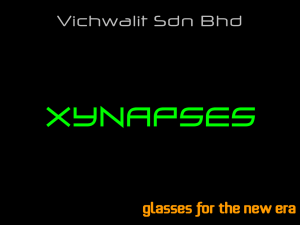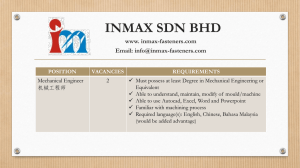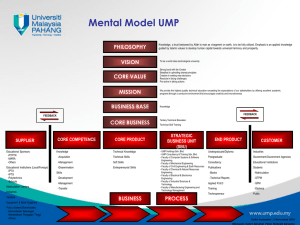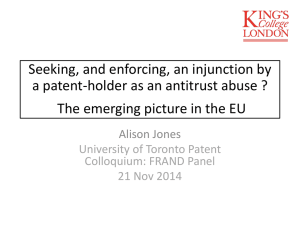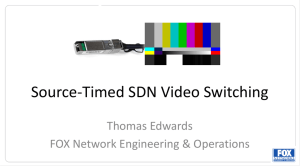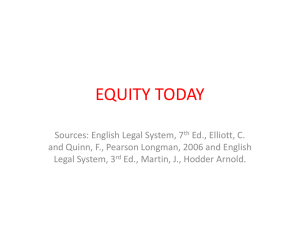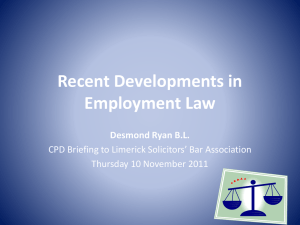injunctions 2 - The Perak Bar
advertisement
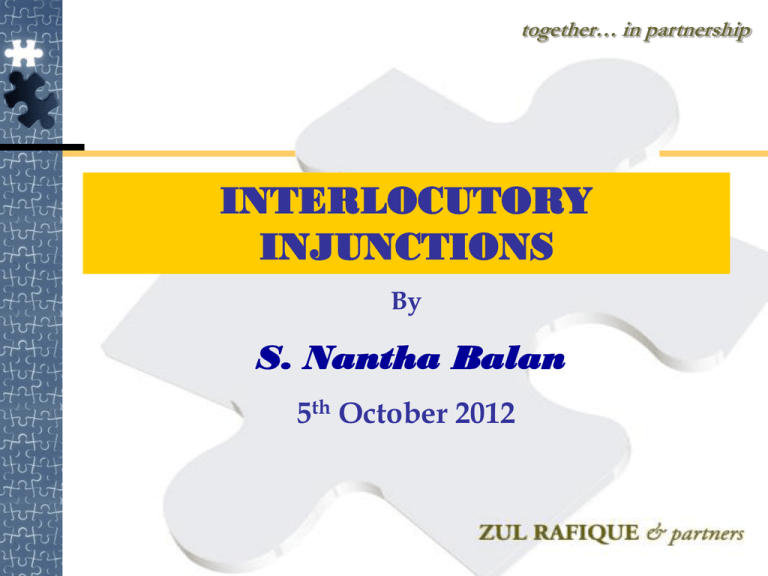
together… in partnership INTERLOCUTORY INJUNCTIONS By S. Nantha Balan 5th October 2012 PROCEDURAL FRAMEWORK RULES OF COURT 2012 (P.U. (A) 205/2012) CORRIGENDUM (P.U. (A) 226/2012) AMENDMENT TO RULES OF COURT 2012 (P.U. (A) 232/2012 AMENDMENT (No. 2) TO RULES OF COURT 2012 (P.U. (A) 286/2012) INJUNCTIONS Subordinate Court (Amendment) Act 2010 Act has been passed but has not come into force yet. Act now enables the Sessions Court to deal with matters in relation to injunctions/ equitable relief. Types of Injunctions Prohibitory – restrains party from doing a positive act. Mandatory – compels party to do a positive act. Interim/Interlocutory – limited to last until a further order, or until the final hearing of the case. Quia Timet – granted against a threatened or apprehended wrong which has not been committed. Mareva – granted in certain cases where it is desired to restrain the dissipation or disposal of assets. Erinford – a stay order until the appeal is heard. Perpetual – a final injunction where the order is made at the end of the hearing. Anton Piller – order to enter premises and seize documents. Sources of Legislations Section 25(2) Courts of Judicature Act 1964 [paragraph 6 of the Schedule to CJA]. Section 50 to 54 Specific Relief Act 1950 Order 29 Rules of Court 2012 Right to an Injunction Right to an Injunction A right to obtain an interlocutory injunction is not a cause of action…the right to obtain an interlocutory injunction is merely ancillary to the pre-existing cause of action Dial Singh a/p Tara Singh v Mann Foong Realty Sdn Bhd [2000] 3 MLJ 153 at160 CA See also: (Siskina (Cargo Owners) v Distos SA [1979] AC 210) INTERLOCUTORY INJUNCTIONS What is it? In the words of Salleh Abbas FJ: Interlocutory injunction is a temporary and discretionary remedy. The court is not concerned with the chances of success or failure of the appellants in proving their suit at trial. The court is concerned with what it has to do to protect the right of the parties so that no irreparable injury would caused to either of them. Lian Keow Sdn Bhd v Overseas Credit Finance Bhd [1982] 2 MLJ 162 Is limited to last until a further order, or until the final hearing of the case. INTERLOCUTORY INJUNCTIONS General Purpose: To maintain or preserve the status quo. To prevent hardship or prejudice to one or other parties. To preclude one party from overreaching or outwitting the opposite party. To prevent “surprise” at trial - Ensure all cards are on the table. To preserve a fair balance between the parties and to give them due protection while awaiting the finality of any proceedings. MODE OF APPLICATION By Notice of Application (Form 57) Application Affidavit - made in chambers or open court - written evidence under oath containing material and relevant facts or statements by way of evidence relating to the matter in question MODE OF APPLICATION Notice of Application (Form 57) Ex Parte Applications Where it is a matter of urgency Made by affidavit – Lim Hean Pin v Thean Seng Co Sdn Bhd [1992] 2 MLJ 10 • Full & Frank Disclosure – No F&F Disclosure may result in the ex parte being set aside. This discretion is exercised based on the nature and severity of the non disclosure “party seeking ex parte injunctions must proceed with the highest good faith, and keep back no material facts" - Schmitten v. Faules [1893] WN 64 MODE OF APPLICATION Setting aside Ex-Parte orders (Order 32 rule 6 ROC 2012) "There is a right in interlocutory proceedings for a party to apply to set aside an order made in his absence, whether or not the matter had been heard on its merits, and whether the matter was an appeal against the decision of the registrar or an application in chambers per se RHB Bank Bhd v F G G Wood Mouldings Industries Sdn Bhd [2001] 4 MLJ 86 Order 29 Order 29 r 1: Even a Defendant may apply for an ex –parte injunction – PERMODALAN MBF SDN. BHD. v. TAN SRI DATUK SERI HAMZAH ABU SAMAH & ORS. [1988] 1 CLJ 244 (Rep) [1988] 1 CLJ 31 which had held that a defendant may not make an application for an injunction on an ex-parte basis is no longer good law. Order 29 (con’t) Mandatory conditions in support of the application? To satisfy the requirements as set out in r 1(2A) – affidavit must contain (amongst others): Facts giving rise to the claim and application Facts relied to justify the application ex parte any facts which may lead to the Court not to grant the application ex parte or at all The precise relief sought… Order 29 (con’t) If originating process is not issued within two days of the Order, the injunction may be discharged – r 1(3) O29 – states that an ex-parte application is only valid for 21 days from the date of the order Order for interim injunction must be made in Form 53 Order 29 (con’t) Order 29, rule 1 (2B) Unless sooner revoked or set aside, an interim injunction obtained on an ex-parte application shall automatically lapse at the end of 21 days from the date on which it is granted. (2BA)The ex parte interim injunction must be served on the relevant party within one week of the date of the order granting the Interim injunction, and the Court when granting the injunction must forthwith fix a date for inter partes hearing to be held before the expiry of the 14 days Order 29 (con’t) Order 29 r 1(2BA) has been amended to state that the Court must fix the inter partes date within 14 days of the ex-parte Order, and not 21 days as under RHC. Order 29 (con’t) Note: Order 29 will apply to the Sessions Court only when the Subordinate Courts Amendment Act 2010 comes into effect. Interlocutory Injunctions Guidelines by Lord Diplock: American Cyanamid Co v Ethicon Ltd [1975] A.C. 396 Gopal Sri Ram JCA: Keet Gerald Francis Noel John v Mohd Noor @ Harun Abdullah & 2 Ors [1995] 1 AMR 373 American Cyanamid Co v Ethicon Ltd [1975] A.C. 396 Guidelines : a) There must be a serious question to be tried; b) P must show that damages would not be an adequate final remedy; and c) The interim relief is justified on the balance of convenience –weigh the balance of convenience in deciding whether to grant an injunction. Balance of convenience Is an evaluation of the degree of harm either party might suffer if the injunction is, or is not granted, And the extent to which such harm could be compensated by damages Court is not required to consider this test where there is no arguable defence Court is required to consider the essential justice of the case Syarikat Jeleta Bumi Sdn Bhd v Nadarajah a/l Ramasamy [2003] 5 MLJ 542 Defendants occupying the premises for several generations, to ask them to vacate and cause the premises to be demolished would cause great hardship as they were poor and did not have alternative place to stay See also Chong Chooi Ying v Guan Soon Development Pte Ltd [1991] 2 CLJ 2277 b) Balance of convenience test (con’t) Other factors: The importance of preserving status quo of parties ( Garden Cottage Foods Ltd v Milk Marketing Board (1983) 3 AC 130 ) Relative strength of parties’ respective cases Public interest (Zainal Abidin bin Omar v Tenaga Nasional Berhad [1993] 4 CLJ 130) c) Adequate remedy If the applicant succeeds at the trial, an award of damages would be adequate compensation, then interlocutory injunction will be refused. Parkway Properties Pte Ltd v Page OneThe Book Shor Pte Ltd [1986] 1 MLJ 291 Puncak Niaga Holdings Bhd v NS Water Sdn Bhd [2004] 5 MLJ 430 Situations in which American Cyanamid is inapplicable Not applicable to an irrevocable letter of credit and to an on demand performance bond. Lotteworld Engineering & Construction Sdn Bhd) v Castle Inn Sdn Bhd & Anor [2000] 3 MLJ 339 Where the Applicant does not have the legal status to claim for injunction. Ming Yueh Holdings Sdn Bhd v Kong Ming Bank Bhd [1990] 1 MLJ 374 American Cyanamid is inapplicable (con’t) - Winding Up petition When a court exercises its discretion to issue an injunction to restrain the presentation of a winding up, it exercises its inherent jurisdiction. Tan Kok Tong v Hoe Hong Trading Co. Sdn Bhd [2007] 2 CLJ 305 When deciding whether to grant an injunction to restrain a petition that is based on a statutory demand for a debt, the court must be satisfied that the debt is bona fide disputed on substantial grounds. Stonegate Securities Ltd v. Gregory [1980] 1 All ER 241 American Cyanamid is inapplicable Winding Up petition (con’t) Stonegate Securities Ltd v Gregory [1980] 1 All ER 241 When deciding whether to grant an injunction to restrain a petition that is based on a statutory demand for a debt, the court must be satisfied that the debt is bona fide disputed on substantial grounds. Hence it is not enough that there is a serious question to be tried. In other words, this is one of those cases to which the general test laid down in American Cynamid. American Cyanamid is inapplicable Winding Up petition (con’t) Natseven TV Sdn Bhd v Television New Zealang Ltd [2001] 4 CLJ 722, Low Hop Bing J American Cynamid Co v. Ethicon Ltd [1975] AC 396; [1975] 1 All ER 504 as applied in Keet Gerald Francis Noel John v. Mohd Noor bin Abdullah & Ors [199] 1 MLJ 193 is not applicable as the applications there were not applications to restrain winding up petitions or proceedings, such as in the instant case before me. Illustration of a prima facie case may be provided by necessary evidence that there is a bona fide dispute by the plaintiff in relation to the statutory demand or that the plaintiff is solvent.” When Injunctions may not be granted? I. Delay - Evercrisp Snack Products (M) Sdn Bhd v Sweeties Food Industries Sdn Bhd [1980] 2 MLJ 297 Plaintiff was suspended for six months and sought interim relief after delay of two(2) months; interim injunction refused as discretionary remedies are exceptional in nature and should not be made available to those who sleep on their rights. When Injunctions may not be granted? Larut Consolidated Bhd & Anor v Khoo Ee Bee & ors [1997] 5 MLJ 77 There was a delay of over 3 years before the Plaintiff sought redress from the court. The court however held that “ongoing negotiations” is excusable: For delay to operate as a bar, it was essential that it should prejudice the defendants. From the facts of the case, in no way whatsoever were the defendants disadvantaged by the delay. The plaintiffs had raised sufficient evidence to warrant the grant of the ex parte Mareva injunction. The plaintiffs had also satisfactorily explained the delay in that their main cause of action was the tort of conspiracy which ought to be pleaded with great particularity and required sufficient evidence. When Injunctions may not be granted? “Ongoing negotiations” (con’t) As for the delay in the application for interim injunction. I believe the defendants are not prejudiced. Besides the delay was due to ‘ongoing negotiations’ between the parties. Also a delay of two years was excused in Larut Consolidated Bhd v Khoo Ee Bee [1997] 5 MLJ 77. SAP (M) Sdn Bhd & Anor v. I World HRM Net Sdn Bhd & Anor [2006] 2 MLJ 678 When Injunctions may not be granted? II. Full and Frank Disclosure Order 29 r 2A RHC • Duty to disclose to the court all matters which are material to the proceedings including any defence that the applicant has reason to believe may be advanced by the other party. • The provisions of O 29 r 2A were introduced by amendment in order to ensure that ex parte injunctions of any sort were not granted, but only in cases where they were truly called for. When Injunctions may not be granted? Full and Frank Disclosure (con’t) • … Having perused the affidavit in question, we find that there has not been even a feeble attempt to meet the requirements of r 2A. On this ground alone, the ex parte injunction ought to have been dissolved by the learned judge. Motor Sports International Ltd (servants or Agents at Federal Territory of Labuan) & Ors v Delcont (M) Sdn Bhd [1996] 2 MLJ 605 However … Circumstances where the court may still grant the injunction despite failure to make full and frank disclosure:fact was not known or it’s relevance was not perceived by the applicant; (b) the Defendant has not been prejudiced. (a) See: Asia Polyurethane Manufacturing Pte. Ltd. v. Woon Sow Liong [1990] 2 MLJ 463 When Injunctions may not be granted? III. No cause of action Indorsement in writ must disclose a justifiable cause of action – Lim Hean Pin v. Thean Seng Co Sdn Bhd & Ors [1992] 2 MLJ 10 “One of the essential requirements for granting and interlocutory injunction is that the court must be satisfied that there is a serious question to be tried and the grant of an injunction depends on whether there is a cause of action” - Lim Chong Construction Co Sdn Bhd v. Silam Quarry Sdn Bhd [1990] 2 MLJ 423 When Injunctions may not be granted? IV. Other matters to be considered Compliance with Order 29 r 2(A) for Ex-Parte. Equitable Principles (“unclean hands”). Duty to Full and Frank Disclosure. Motor Sports International Ltd (servants or Agents at Federal Territory of Labuan) & Ors v Delcont (M) Sdn Bhd [1996] 2 MLJ 605 All the proper, necessary and interested parties must be before the court for the application. Hong Kong Vegetable Oil Company Ltd v Malin Sirinaga Wicker & Ors [1978] 2 MLJ 13 MAREVA INJUNCTION Mareva v. International Bulkcarriers Ltd [1980] 1 All ER 213 In that case, an injunction was granted to restrain the defendant from improperly disposing of his assets or concealing, or moving them abroad for the sole purpose of defeating an action against him. The courts have inherent powers under O 92 r4 to grant Mareva injunction. Mareva injunction Only granted if satisfies the 3 fold test (a) Whether the applicant has an arguable case?; (b) The respondent has assets within jurisdiction?; and (c) Is there a risk of dissipation? Mareva Injunction - Procedure Ex-parte application supported by affidavit. Must set out information to the existence of the assets sought and the grounds for belief that a refusal would involve a real risk that assets would be dissipated and if judgment obtained in his favour, the Defendant will not be in a position to pay it. Mareva Injunction Considerations in applying for Mareva How broad need the terms of the proposed injunction be to safeguard the plaintiff’s claim. To what particular assets of the proposed defendant should the injunction be applied-identifying the same. If it is known that assets are in the hands of 3rd parties, everything should be done to define their location. i.e Bank:(a) which bank(s) (b) address of relevant branch (c) Account numbers-if possible Mareva Injunction Considerations in applying for Mareva See also : Tan Sri Dato’ Dr Awang Had B Salleh v Dato Dr Haji Mohamad Haniffa Bin Haji Abdullah [2007] 6 MLJ 293 Interim order granted to preserve status quo by restraining Defendant from disposing shares and cash as Plaintiff had a genuine proprietary tracing claim. Mareva Injunction Practice Point, the Mareva Order should : clearly identify the assets covered, and to what extent, e.g (a) The location of the money (b) The bank which holds it and which branch (c) the number and type of account. make clear whether the Order covers all assets held by the bank (including chattels) or just monies. If Plaintiff is unsure: (a) to include all assets in the order (b) to ask the court to order the defendant to swear an affidavit listing his assets and their value. Mareva Injunction Factors vitiating a Mareva order No good arguable case Failure to disclose Set off Insufficient evidence of risk of dissipation Variation of order Mareva Injunction Factors vitiating a Mareva order (con’t) No provision for the Ds necessities “The Mareva injunction granted was oppressive as the order failed to make provisions for the fourth defendant's living expenses and legal costs and it also overstated the maximum monetary limits of the injunction's intended coverage. It was sound law that a failure to provide for living expenses and for payment of ordinary debts as they become due in an order for a Mareva injunction ought to be valid grounds to discharge that order”. Larut Consolidated Bhd & Anor v Khoo Ee Bee & ors [1997] 5 MLJ 77 Mareva Injunction Limitation to Mareva order: No priority • Its not a pre-trial attachment but a relief in personam which prohibits certain acts in relation to the assets in question hence limits the relief sought through the Order. Does not block a judgment creditor • A judgment creditor can enforce a judgment against frozen assets. See Iraqi Ministry of Defence v Arcepey Shipping Co. SA [1980] 2 WLR 488 Does not block a pre-existing creditor. Mareva Injunction How to avoid limits to Mareva Seek from defendant a consideration for discharge of Mareva:(a) Compel D to pay money into court (b) Compel D to provide a bond or guarantee that the Plaintiff’s debt will be met [The Assios [1979] 1 Lloyd’s Rep. 331] ANTON PILLER Anton Piller KG v Manufacturing Processes Ltd [1976] 1 All ER 405 Preconditions extremely strong prima facie case against the D. damage, potential or actual to the P is great if the order is not granted. clear evidence that the D has in his possession incriminating documents. real possibility that the D may destroy such incriminating material before any application inter partes can be heard. Anton Piller Basic Requirements (amongst others): Arthur Anderson & Co v Interfood Sdn Bhd [2005] 6 MLJ 239 at 253: (a) defendant has in its possession the relevant documents and/or materials being sought for and that there is a real possibility that the defendant may destroy such documents and/or materials, (b) applicant required to make a full and frank disclosure. Yousif v Salama [1980] 3 All ER 405 The court had a discretion to grant an Anton Piller order to enable the preservation of a document which did not itself form the subject matter of the action. Anton Piller Duty of full and frank disclosure (con’t) if the duty of full and frank disclosure was not observed by the plaintiff and that there were misleading averments advanced by the plaintiff, the court is entitled to discharge the Anton Piller order. Apparatech (M) Sdn Bhd v Ng Hock Chong & Anor [2006] 1 CLJ 60, [2006] 2 MLJ 61 Anton Piller Anton Piller may include a batch of other orders: An injunction to restrain • Particular activities An order to disclose the names and addresses of 3rd parties “mixed up” in the allegedly tortuous activities. An order directing the Defendant • To permit a search of its premises and the removal of particular items • Immediately disclose the whereabouts of materials or information covered by the Order Privilege against Self-Incrimination At Common Law Rank Film Distributors Ltd & Others v Video Information Centre & Others [1980] 2 All ER 273 (CA), [1981] 2 All ER 76 (HL) • the English Court of Appeal held that part of the Anton Piller order requiring the disclosure of certain incriminating evidence was contrary to well established principle of privilege against self-incrimination and would accordingly be expunged. Privilege against Self-Incrimination In Malaysia In Television Broadcasts Ltd & Ors v Mandarin Video Holdings Sdn Bhd [1983] 2 MLJ 346, the court held that a person is not entitled to claim such privilege. In that case, the Court held that in this country the privilege against self-incrimination had been withdrawn by section 132 of the Evidence Act, 1950. Privilege against Self-Incrimination In Malaysia (con’t) It was held further in Television Broadcasts Ltd that such privilege will only be available should the Anton Piller order be modified to include a statement that the Ds are to be informed that the answers given will not subject them to the risk of prosecution and criminal proceedings except a prosecution for giving false evidence. See also : Arjunan v Kesatuan Kebangsaan Pekerja-pekerja Ladang [1993] 1 MLJ 326 Attorney General of Hong Kong v Zauyah Wan Chik & Ors and anor appeal [1995] 2 MLJ 620, CA Privilege against Self-Incrimination In Malaysia (con’t) However the case of PMK Rajah v. Worldwide Commodities Sdn Bhd & Ors (supra) [1985] 1 MLJ 86 held that the case of Television Broadcasts Ltd had wrongly interpreted the application of Section 132 of the Evidence Act. Privilege against Self-Incrimination In Malaysia (con’t) It was held in PMK Rajah a person served with an Anton Piller order, is not subject to crossexamination or re-examination hence they do not fall within the meaning of the word "witness" in section 132 of the Evidence Act. In other words, section 132 does not apply at all to discovery in respect of an Anton Piller order. Erinford Injunction Erinford Properties Ltd v Cheshire County Council [1974] 2 All ER 448 It is an injunction to preserve the status quo pending disposal of any appeal against the initial refusal of an injunction: ”the exercise of jurisdiction by a court of first instance restraining the successful litigant from enjoying the fruits of his success until the correctness of the decision in question has been tested through the appellate process” Erinford Injunction Considerations • whether there are special circumstances; • Probability that the order refusing an injunction may be reversed; • Whether successful party ought to be free to act; • whether damages would be an adequate remedy; • Would the appeal be rendered nugatory. Erinford Injunction Eg.: Injunction to restrain the sale of pledged shares or property where the complaint is that sale is at an “undervalue”. Erinford may not be granted. vs Injunction to restrain the D from continuing to excavate which causes settlement cracks on P’s property. Interim injunction refused. However Erinford might be allowed so that the P’s appeal may not be rendered nugatory. Quia Timet Injunction To prevent an injury occurring to obtain injunction, applicant must show that there is an imminent danger of substantial damage being suffered, and that it will be impossible for the applicant to protect himself if the injunction is not granted Prohibitory Injunction Whether mandatory or prohibitory, the test is whether there is a serious question to be tried. If there is, and no injustice would be occasioned by the grant of the injunction then the balance of convenience would ordinarily lie in favor of the grant of the injunction Datuk Johari Abdul Ghani & Ors v QSR Brands Bhd & Ors [2007] 4 MLJ 19 Interstate M&E Sdn Bhd v Fore –Sight Trading Sdn Bhd [2007] 6 MLJ 677 Mandatory Injunction Principles • Must show a very strong probability upon the present facts that grave damage will accrue to him in the future • Damages will not be sufficient or adequate remedy • Question of the cost to the defendant to do work to prevent or lessen the likelihood of a future apprehended wrong – Redland Bricks Ltd v Morris & Anor [1970] AC 652, 665 Interlocutory Mandatory Injunctions • The plaintiff has to show that it has an unusually strong and clear case and that there are special circumstances in existence warranting this court to grant the injunction in question – Cekal Berjasa Sdn Bhd v Malaysia Building Society Bhd [2005] 3 MLJ 646] Mandatory Injunction (con’t) Never granted before trial save in exceptional and extremely rare cases Test is much more rigid to obtain an ex-parte mandatory injunction However, note the unprecedented order was granted in Ayer Molek Rubber Co. Bhd & Ors v Insas Bhd & Anor [1995] 2 MLJ 734 Mandatory Injunction – Ayer Molek’s case The High Court granted an ex-parte mandatory injunction against the defendants to effect the registration of the transfer of 540,000 shares of the defendant to the plaintiff within 2 working days. Although Court of Appeal heavily criticised the decision and went as far as to say that the court’s inherent powers have been abused, the Eusoff Chin CJ however expunged the criticism in the Federal Court. Injunctions against the Government Interim and Government Permanent Injunctions against S 29 of the Government Proceedings Act 1956 Act does not prohibit the grant of temporary injunctions against the Government. In it was held that the section 'does not take away therefore the right of the court to grant an interlocutory injunction'. Tengku Haji Jaafar & Anor v Government of the State of Pahang [1978] 2 MLJ 105 Distinguish with: Nanthakumaran v Jafanese Co-operative Housing Ltd [1980] 1 MLJ114 Society INJUNCTIONS AGAINST THE GOVERNMENT (con’t) Sabil Mulia (m) Sdn Bhd v Pengarah Hospital Tengku Rahimah & Ors [2005] 3 MLJ 325 The courts have jurisdiction to grant interim and permanent injunctions against any servant of the Government. Since a Government servant or a member of the Cabinet may be restrained by injunction, it is strictly unnecessary from a practical point of view to decide whether the Government itself may be restrained in appropriate circumstances . See: TIDALMARINE ENGINEERING SDN BHD v. KERAJAAN MALAYSIA [2012] 3 CLJ 385 ( where relevant cases are all discussed ) Injunction in Defamation suits Harakas v Baltic Merchantile and Shipping Exchange Ltd [1982] 2 All ER 701 Where the defences of justification or qualified privilege are raised to an action for libel, an interlocutory injunction will not be granted unless malice can be shown on the part of the publisher. Injunction in Defamation suits (con’t) Herbage v Pressdram Ltd [1984] 2 All ER 769 It was held that the publication of spent convictions is actionable only if activated by malice, in the sense of irrelevant, spiteful or improper motive. An injunction to restrain publication will only be granted only if the evidence of malice is overwhelming. Injunction in Defamation Suits (con’t) The News Straits Times Press (M) Bhd v Airasia Bhd [1987] 1 MLJ 36 The respondent claimed damages against the appellants for libel alleged to be contained in articles published in the Sunday Mail. The appellants in their defence raised the defences of justification and fair comment in the public interest. Respondent had applied for an injunction and by ex parte application applied for an interim injunction in libel actions. The News Straits Times Press (M) Bhd v Airasia Bhd [1987] 1 MLJ 36 (con’t) It was held that the judge should not have granted the injunction against a defendant who specifically pleaded justification and had raised a defence fair comment on a matter of public interest. THANK YOU S. Nantha Balan Email : nb@zulrafique.com.my Tel : 03-6209 8371 Fax :03-6209 8373
